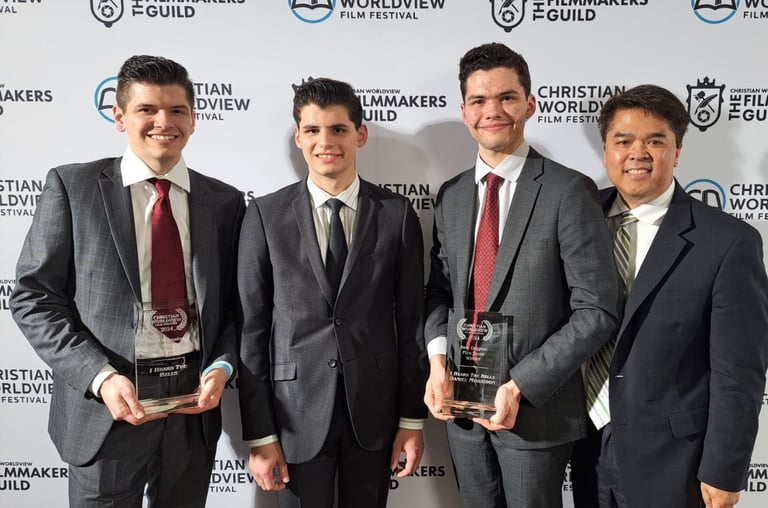George Escobar
From Hollywood to co-launching two Christian non-profit film ministries.
Hannah L. Benson
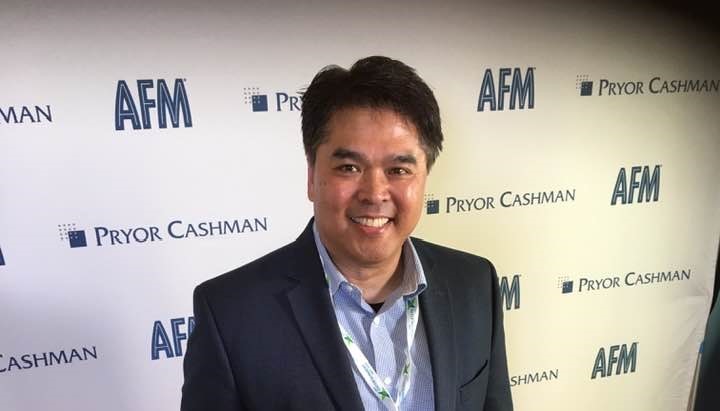

The Early Years
George was born and raised in the Philippines for most of his early years until his family moved to Southern California when he was 10 years old. Shortly after their move, That’s Entertainment!, a compilation film created to celebrate the 50th anniversary of Metro-Goldwyn-Mayer came out, and George’s parents took him to see it in the theaters. “These were movies that had been made in the 30s, 40s, and 50s predominantly,” George explains, “and there was no way to watch them [unless you saw them in theaters when they first came out], so I’d never saw them before until That’s Entertainment! came out, and I was just blown away at the level of talent.”
That may be putting it mildly. In fact, during the time the movie ran in theaters, George somehow convinced his parents to drop him off at the theater every weekend. “And I would just stay there, and I would watch it over and over and over because I knew that once it was gone, there was no way to watch it again.”
The wheels of inspiration were spinning for George, and he knew he wanted to make something like that someday.
Surrendering the Dream
The problem? Musicals were going out of style, so George’s dream of creating a film settled into other forms of storytelling including journalism and photography in high school. He loved writing and picked up the ability to emulate style. When asked by his teacher how everything he wrote was stylistically different, George said, “Well, I look at different source material, and I start writing in that style.” In addition to writing and photography, George is a gifted artist. “The Lord gifted me with the ability to draw and paint…I didn’t earn it, didn’t deserve it,” he says. His love of creating and drawing eventually led him to pursue architecture, a career that seemed more viable than film at the time.
“I was not good in math,” he confesses, “so I took drafting classes, and I would draw, I would design cars and buildings and things like that.” George loved studying experts like Frank Lloyd Wright. In college, he took some business and film classes which eventually led to his transfer to the American Film Institute where he dropped the pursuit of a career in architecture altogether. “I was as shocked as anybody that I got accepted into the AFI,” George says, “because that was major-league film school…so the Lord, He put me in there.”
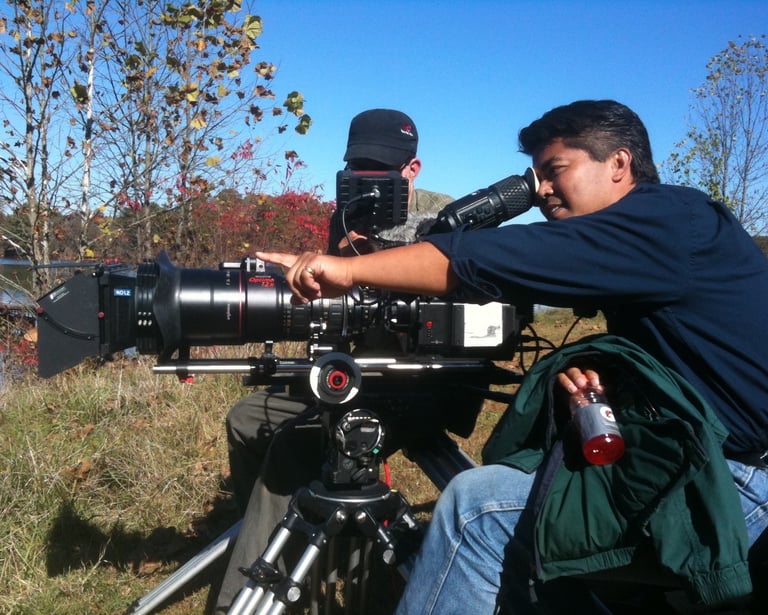

Yes, George recognizes the hand of God in his life and has since he was 16 years old. “This gal in high school kept asking me to go to church with her,” he remembers. He didn’t want to go but finally consented in the hopes she would stop bothering him about it. It turned out to be “a divine appointment,” George says. “They had an evangelist there who preached a fire and brimstone sermon which seared my heart and got [me] down on my knees and I asked for forgiveness. And I know [then] I was a believer.” There was no follow-up, but “the Lord is faithful and gracious, and I can recount now and remember all the ways that He protected me from that moment on that I could’ve gotten into some really bad places and done some really bad things…but He just says, ‘Nope, you’re mine. I’ll let you experience life, but I’ll protect you.’”
Looking back, George sees God’s protection over all his life, but especially when he transitioned from the American Film Institute to working as assistant to director on TV shows like The Love Boat and Square Pegs. After graduating from AFI, a film school that accepts less than 100 students a year, George could get a meeting with anybody including the president of Paramount Pictures. “I was so full of myself,” George admits. “I thought I was this great filmmaker. I got an interview with…the head of [New World Pictures] at the time…and I actually wrote a job description for myself that I gave him during our meeting. He just laughed,” George recalls. The kind CEO did offer George a position working in New World Pictures’ story department as a story analyst on a trial-and-error basis.
What Happened Next
So, George moved to Santa Monica and stayed in a friend’s dorm during the summer. “I would read from a stack of screenplays,” he remembers. “I would take about two to three hours to read them and take another two to three hours to write the story analysist report.” His paycheck? A whooping $20-$25 per script. “Dirt poor,” George says with a chuckle. “I remember just living on peanut butter and jelly sandwiches except for the weekends [when] I would get myself a chicken dinner at El Pollo Loco.”
Eventually, George was offered a job as a creative executive for Aaron Spelling Productions. “I mean, that was big,” he recalls. “Aaron Spelling had all the…. top six or the top ten shows on TV.”
Except there was a problem. George had already accepted a job all the way across the country in Virginia working on the Strategic Defense Initiative. “That’s really the crux of it,” he says. “I was becoming like the people I didn’t want to become…. The Lord knew He had to protect me, so He literally took me away. Not just physically in space across the country but in time because I was out [in California] for almost 25 years.” George calls those years his wilderness experience, like Moses getting sent out of Egypt so he could purge himself from everything toxic.
It was a low point in George’s filmmaking life, but “the Lord blessed that time because I still got to work with some of the top people in the industry in different capacities in business and technology.” Not to mention some of his inventions (yes, George is also an inventor) were patented and still used today by people everywhere. An example includes the predictive browsing patent and a patent that allows users to see a customized experience when watching something on a streaming channel.
“These low points are actually highlights,” George says. “I can put a marker on them and say…you should never look at them as low points. Look at them as opportunities the Lord has given you to then go find out why he put you there and what is the next journey.”
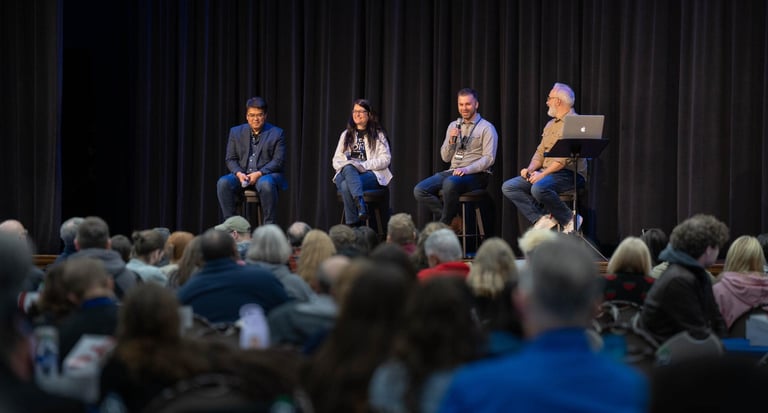

Advent Film Group
When working as VP of Product Development at Discovery, there was a change in leadership which eventually meant “a bunch of us were going to be let go,” George says. “I didn’t know that was going to happen.”
But the Lord did and prompted George’s wife, Claire, to encourage him to take their youngest son to the San Antonio Independent Christian Film Festival. That’s when George met Stephen Kendrick, producer and writer now known for movies such as War Room, Fireproof, Courageous, and the newly released, The Forge. At the time, the Kendrick Brothers’ second movie, Facing the Giants was just beginning to get noticed and get box office results. Over the course of their conversation, Stephen asked George what he’d been doing with all the gifts the Lord had given him. “I had to confess, it was zero. Nothing. I had never done anything except for working in the media ministry at church,” George says.
Determined to change that, George went home, got on his knees, and cried out to the Lord for both forgiveness and direction. “When you ask that kind of prayer… the Lord is about to do something.”
A few months later, after so many people were let go because of the change in leadership at Discovery, George found himself writing a business proposal for Advent Film Group, a film production company created “to help young filmmakers, to train them up, raise them up, so they didn’t make the same mistakes I did,” George says. “That’s really scary because launching a new company with young kids and raising a young family, how do you know the Lord wants you to do that?”
If George needed proof, God was about to give it.
In April 2008, before AFG’s first movie, Come What May, was even well-developed, George met with Michael Farris over at Patrick Henry College and told him he wanted to make a film that would take place at the college and would honor Moot Court students. Well, Mike didn’t have any money to invest, but he did offer George 2-3 weeks in early July to shoot the film.
This meant AFG had to raise $300,000 in just 3 months.
George’s Hollywood friends, who he’d kept up with, had told him it would take “30 accredited investors before [he’d] find one to invest.” God, however, was not interested in a 30:1 ratio and allowed George to meet with 20 investors, all of whom said yes when asked to invest in the project. “That’s a miracle,” George says.
In addition, the movie went on to become somewhat instrumental in helping shape the argument that finally overturned Roe v. Wade. “Talk about God knowing exactly what He wanted to do and using little people like us to help do it,” George says with a chuckle.
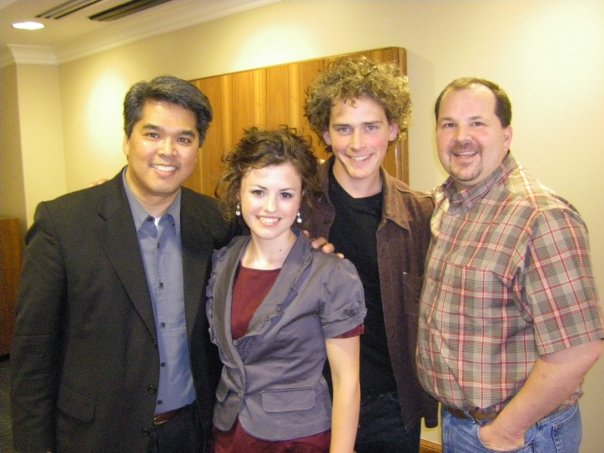

Since Then
Fast forward to January 2024. George and his good friend, GRAMMY award-winning entertainment attorney, Dr. Joel Bunkowske, signed a contract with the up-and-coming Morrison Brothers, officially marking the development of The Victory Swing feature film. This led George and Joel to launch 3 Days Studios several months later in November.
To date, the studio has multiple projects in development, including the highly-anticipated The Victory Swing and an exciting new TV series, Prairie Winds, a family-friendly western reminiscent of Little House on the Prairie, When Calls the Heart, Love Comes Softly, Dr Quinn, Medicine Woman, among many other cherished classics. The reason? “Nobody had been making any [historical westerns recently] that families could watch,” George says. And after seeing the success of the Angel Studios model, George and Joel decided to become “fast followers of Angel Studios” with the launch of 3 Days Studios and its Membership Guild.
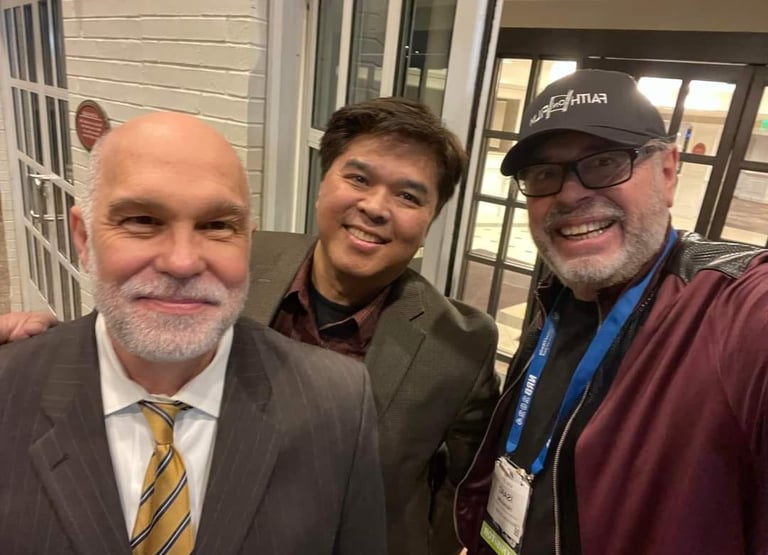

Photos provided by George Escobar.
From left to right: George, Victoria Emmons and Austin Kearney (COME WHAT MAY), and Kurt Ramspott.
The Journey Ahead
There are so many exciting things “coming down the pike” in relation to 3 Days Studios and its sister company, Storytellers Film Academy (SFA), George says. They hope to continue going where the Lord wants to go and “hopefully, He’ll bless it.” Success is “really up to [God],” George says. “We just have to do the work and have Him to continue to equip us to do it.”
“There’s only two types of films that anybody can ever make in the entire world,” George says. “One type…pushing you away from Christ. And the other is pulling you towards Him. That’s it.”
No matter what George does—whether mentoring, writing novels, directing, producing, screenwriting, helping to raise two Christian non-profit ministries off the ground, spending time with his family (he also has 3 grandchildren)—his goal is to glorify God. After all, God alone is the Giver of every good gift, and He deserves all the credit for the abundant blessings in our lives.
From left to right: George Escobar, Cheryl McKay, Aaron Burns, and Stephen Kendrick.
